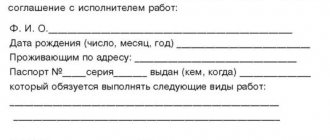Established grounds for unilateral refusal.
Unilateral refusal to fulfill obligations under a contract is permitted only in cases provided for by the Civil Code itself, other laws or other regulations (Article 310 of the Civil Code of the Russian Federation).
In particular, with regard to a purchase and sale agreement, civil legislation provides for the buyer’s right to refuse to fulfill such an agreement if the seller does not transfer the sold goods to the buyer (clause 1 of Article 463 of the Civil Code of the Russian Federation). Another example: if a rental agreement has been concluded, the tenant has the right to refuse to fulfill it at any time, having notified the lessor in writing of his intention at least ten days in advance (Clause 3 of Article 627 of the Civil Code of the Russian Federation).
On the basis of civil law, unilateral refusal to perform is also possible in relation to supply contracts and paid services.
In the first case, the buyer has the right to refuse if the supplier has provided goods of inadequate quality, with defects that cannot be eliminated within a time acceptable to the buyer, or has repeatedly (that is, more than once) violated the delivery deadline. The supplier has a similar right if the buyer has repeatedly violated the terms of payment for goods or has repeatedly failed to select them. In this case, the contract will be automatically considered terminated from the moment one party receives a notice from the other party about a unilateral refusal to perform, unless a different termination period is provided for in the notice or is not determined by agreement of the parties (Article 523 of the Civil Code of the Russian Federation).
In the second case, the customer has the right to refuse to fulfill the contract for the provision of services for a fee, subject to payment to the contractor for the expenses actually incurred by him, and the contractor has the same right, subject to full compensation for losses to the customer (Article 782 of the Civil Code of the Russian Federation).
In addition, with regard to the work contract, the Civil Code of the Russian Federation has a similar rule: unless otherwise provided by the contract, the customer, at any time before delivery of the result of the work to him, has the right to refuse to fulfill the contract by paying the contractor part of the established price in proportion to the part of the work completed before receiving the notice of refusal of the customer to fulfill the contract. At the same time, the customer is also obliged to compensate the contractor for losses caused by termination of the contract, within the difference between the price determined for the entire work and part of the price paid for the work performed (Article 717 of the Civil Code of the Russian Federation).
Finally, civil law establishes that if one of the parties to the contract does not have a license to carry out activities or membership in a self-regulatory organization necessary to fulfill the obligation under the contract, the other party has the right to refuse to fulfill it and demand compensation for losses (clause 3 of Article 450.1 of the Civil Code RF).
Under contracts concluded within the framework of Law No. 223-FZ, the parties should adhere exclusively to the norms contained in the Civil Code itself.
As for the cases established in “other laws,” we will take as an example the situation with the provision of communication services, when the user violates the requirements of the contract and does not eliminate this violation within six months after receiving a written warning from the communication service operator. Then the operator has the right to unilaterally terminate the contract (Part 3 of Article 44 of the Federal Law of July 7, 2003 No. 126-FZ “On Communications”). A complete list of such cases can be found in legal reference systems by following the appropriate links to paragraph 1 of Art. 310 Civil Code of the Russian Federation.
Additionally, we point out that these cases also include procurement under Law No. 44-FZ. The customer has the right to decide on a unilateral refusal to fulfill the contract on the grounds provided for by the Civil Code of the Russian Federation for unilateral refusal to fulfill certain types of obligations (see above), provided that this was provided for by the contract (Part 9 of Article 95 of Law No. 44-FZ ). Moreover, in certain cases this is even the responsibility of the customer. For example, if during the execution of the contract it turns out that the supplier and (or) the supplied goods do not comply with the requirements for participants and (or) the supplied goods established by the notice and (or) procurement documentation, or the supplier provided false information about its compliance and (or) compliance of the supplied goods to such requirements, which allowed it to become the winner in the procurement procedure (Part 15 of Article 95 of Law No. 44-FZ).
But if the contract provided for the right of the customer to make a decision on unilateral refusal to fulfill the contract, a similar right (again, on the grounds established by the Civil Code of the Russian Federation) arises for the supplier (Part 19, Article 95 of Law No. 44-FZ). The said decision made by the customer or supplier comes into force (the contract is considered terminated) ten days from the date of proper notification by one party to the other party of the unilateral refusal to perform the contract. Ten days are given to “correct errors”: if the violations are eliminated, the party that made the decision must cancel it and the contract will continue to be executed (Articles 13, 14, 21, 22, Article 95 of Law No. 44-FZ). This is exclusively an “additional” provision of Law No. 44-FZ regarding the procedure and conditions for unilateral termination of a contract. True, it will no longer work in the event of a repeated violation of the contract by the supplier, which became the basis for the customer’s unilateral refusal to fulfill the contract (Part 14, Article 95 of Law No. 44-FZ).
In this context, it is important to take into account that information about the supplier with whom the contract was terminated due to the customer’s unilateral refusal to perform it is included in the register of unscrupulous suppliers (contractors, performers) (Part 16 of Article 95 of Law No. 44-FZ).
Unilateral procedure for termination of obligations
This possibility is defined by Part 8 of Article 95 of 44-FZ, provided that the corresponding clause is included in the text of the contract. Otherwise, the obligations of the parties will need to be annulled in court.
Civil law allows either party to take the initiative to terminate the contract. The algorithm of actions for them will be similar in accordance with Article 95 of 44-FZ.
If the customer wishes to terminate the contract, he must place information about this in the Unified Information System within 3 days after making such a decision. Then notify the supplier of your intention. This can be done in any way, as long as confirmation of delivery of the notice is received (for example, a registered letter return, information about the receipt of a telegram, or a read receipt by e-mail).
The supplier is given 10 days to eliminate errors (if the violation is committed for the first time). If the contractor has not corrected all the shortcomings, then the decision becomes valid. If corrected, the customer cancels the decision (Part 12-18 of Article 95 of 44-FZ).
If the contractor wishes to refuse the contract, he can do so if such a possibility was agreed upon in advance in the contract, and his rights have been violated. He also informs the customer of his decision within 3 days. If the customer has not corrected the deficiencies within 10 days, the decision becomes valid (Part 21 of Article 95 of 44-FZ).
If the parties terminate cooperation, then until the moment of termination they are obliged to pay partially fulfilled obligations. For example, if the contractor has already transferred part of the goods to the customer, and he accepted it, then payment must be made for the actual volume. The same condition applies to works and services.
If the contractor improperly fulfills his obligations and the customer has carried out the necessary examination, then in order to continue cooperation he must not only give an obligation to improve and deliver a quality product (work, service) as stipulated in the contract, but also return the costs incurred for examination.
2.1 Reasons for unilateral termination of cooperation by the contractor
- The customer did not pay for the delivery or work on time. There must be two or more such delays (clause 3 of Article 523 of the Civil Code of the Russian Federation).
- The customer unreasonably refused to accept the goods (works, services). Two or more times (clause 3 of Article 523 of the Civil Code of the Russian Federation).
- The customer intentionally creates conditions that make it impossible to fulfill obligations (Clause 1, Article 719 of the Civil Code of the Russian Federation). For example, it does not provide materials.
- The contractor may demand an increase in the cost of the contract if the materials have become significantly more expensive due to reasons beyond his control. If the customer refuses to increase the price, then the contractor has the right to terminate the obligations unilaterally (clause 6 of Article 709 of the Civil Code of the Russian Federation)
2.2 Reasons for unilateral termination of cooperation by the customer
- The delivery or work was carried out poorly by the contractor. This fact is recorded by independent experts (clause 2 of Article 523 of the Civil Code of the Russian Federation).
- The contractor delivered the goods incompletely and refused to eliminate the defect (clause 2 of Article 480 of the Civil Code of the Russian Federation).
- Late delivery. Must be recorded at least 2 times (clause 2 of Article 523 of the Civil Code of the Russian Federation).
- The contractor, for unknown reasons, does not start work on time or violates the schedule (clauses 2 and 3 of Article 715 of the Civil Code of the Russian Federation).
- During the performance of obligations, the contractor made mistakes and does not correct them, or it is impossible to correct them due to their materiality (clause 3 of Article 723 of the Civil Code of the Russian Federation).
- During the execution of the work, the customer discovered that the contractor did not comply with the requirements of the documentation and 44-FZ (clause 15 of Article 95 of 44-FZ).
- Other reasons provided for by the law of the Russian Federation.
Interestingly, the penalties specified in the contract are imposed on both parties. But if the law is violated, only the supplier ends up in the RNP. Unfortunately, there is no register of unscrupulous customers, although it would be useful in some cases.
Unilateral termination of obligations affects both the customer and the supplier.
For the customer:
- unfulfilled order;
- a pointless waste of time and resources;
- the possibility of recovering from the supplier the costs incurred due to unilateral termination (Part 23 of Article 95 of 44-FZ). They are confirmed in the arbitration court.
For the supplier:
- contract enforcement is rarely returned or returned only after going to court;
- is included in the RNP (Part 16, Article 95 44-FZ);
- the right to demand reimbursement of actual expenses if there were reasons for unilateral termination (Part 23 of Article 95 of 44-FZ).
Termination through court or out of court?
If only one of the parties insists on terminating the contract, and the other does not agree with this, the contract can be terminated by a court decision only if there is a significant violation of its terms by the other party, and in other cases provided for by laws or the contract itself. Moreover, a violation of the contract by one party is considered significant, entailing such damage for the other party that it is largely deprived of what it had the right to count on when concluding the contract (Clause 2 of Article 450 of the Civil Code of the Russian Federation).
In other words, a party cannot terminate a concluded contract only on its own initiative, without an appropriate court decision. However, it should be noted: this norm of the Civil Code of the Russian Federation comes into some contradiction both with the norms of civil legislation establishing cases of “extrajudicial” unilateral termination of a contract (for example, see the situation of unilateral refusal to perform and termination of a supply contract described above), and with the corresponding norms other federal laws, including Law No. 44-FZ.
In this regard, in practice, the question often arises: what to follow when unilaterally refusing to perform and terminating contracts under Law No. 44-FZ - the said law or the Civil Code of the Russian Federation? To give an answer, you need to carefully read Part 1 of Art. 2 of Law No. 44-FZ. It states that the rules of law contained in other federal laws and governing procurement, including the specifics of contract execution, must comply with Law No. 44-FZ. Consequently, if according to the Civil Code of the Russian Federation it is necessary to terminate a contract unilaterally through the court, and Law No. 44-FZ provides for this termination without going to court, the norm of Law No. 44-FZ prevails.
However, this conclusion applies only to contracts concluded within the framework of Law No. 44-FZ. As for the parties to contracts concluded under Law No. 223-FZ, they should adhere only to those norms contained in the Civil Code itself (Law No. 44-FZ no longer regulates the relations of these parties).
If, in a situation of a significant change in circumstances, the counterparties were unable to terminate the contract by agreement of the parties, the decision is made by the court at the request of the initiator of such termination.
That is, on the one hand, according to civil law, the specified counterparty can unilaterally and without going to court only terminate the supply agreement (based on clause 4 of Article 523 of the Civil Code of the Russian Federation). In all other cases, where we are talking only about a unilateral refusal to perform an agreement (for example, when concluding an agreement for the provision of paid services), the counterparty can only refuse to fulfill its obligations under such an agreement, but terminate it if it is impossible to do this by agreement of the parties will have to go through court. In principle, it will not be difficult to achieve the necessary court decision if the refusal to fulfill the contract has already occurred due to the occurrence of cases established by law, but excess time and other resources will still be spent.
On the other hand, the Civil Code of the Russian Federation has a separate rule, according to which in the event of a unilateral refusal of the contract (its execution) in whole or in part (if such refusal is allowed), the contract is considered terminated or amended (clause 2 of Article 450.1 of the Civil Code of the Russian Federation). Although this norm, again, is somewhat inconsistent with the analyzed provision that, without the consent of one of the parties, a contract can be terminated only by a court decision, it is precisely this norm that can be relied upon in a situation where a party, having unilaterally refused to fulfill the contract on the permitted grounds, considers that by doing so she simultaneously terminated the contract. The courts also adhere to this position regarding procurement under Law No. 223-FZ[6].
Let us note that a demand for termination of a contract can be submitted by a party to the court only after receiving a refusal from the other party to the proposal to terminate the contract by agreement of the parties or failure to receive a response within the period specified in the proposal or established by law or the contract, and in its absence - within 30 days term (Article 452 of the Civil Code of the Russian Federation). We also add that in practice, the degree of significance of the damage in each specific case is determined by the court.
Procedure for unilateral termination of a contract
In general, the process of unilateral refusal to execute a government contract is the same for both the customer and the supplier. The only difference is in the consequences - if the customer terminates the contract due to the fault of the supplier, then information about the latter will be sent to the RNP. In practice, most unilateral terminations are initiated by customers.
At the first stage, a decision is made to refuse the government contract. For the customer, such a decision may be preceded by an examination of the subject of purchase. In this case, the expert’s conclusion must indicate that there is a violation of the terms of the contract, due to which it can or should be terminated.
The adopted decision should be placed in the Unified Information System within three working days and sent to the other party in any way that allows you to record the fact of its delivery - by registered mail, by e-mail, by fax, and so on. The day on which the sender of the decision is notified that the second country has received it (or is absent from the specified address) will be considered the date of proper notification. It happens that it is impossible to obtain confirmation of the notice of the second party. Then the notification date occurs 30 days after the information about termination of the contract is posted in the UIS.
10 days after the notification date, the contract is considered terminated. If termination of the contract was initiated by the customer, then information about the supplier is transferred to the RNP. But even before the expiration of this period, the contractor can try to eliminate these shortcomings. If he does this, and also reimburses the customer for the costs of the examination, the latter will be forced to cancel his decision. But only on condition that this violation was not repeated.
Termination due to a significant change in circumstances.
A party may take the initiative to terminate the contract in the event of a so-called significant change in circumstances - so significant that if the parties could have reasonably foreseen it, the contract would not have been concluded at all or would have been concluded on significantly different terms (Article 451 of the Civil Code of the Russian Federation).
If in this situation the counterparties were unable to terminate the contract by agreement of the parties, the decision is made by the court at the request of the initiator of termination.
Judicial practice in relation to this provision of the Civil Code of the Russian Federation mainly concerns the termination of loan agreements, lease agreements, purchase and sale agreements, and donation of real estate. But there was an example from the sphere of public procurement[7].
In 2014, the state government institution “Department of Private Security of the Main Directorate of the Ministry of Internal Affairs of the Russian Federation for the Irkutsk Region” filed a lawsuit to terminate the state contract with the interdistrict inspection of the Federal Tax Service No. 19 for the Irkutsk Region, concluded on the last day of 2013. The reason was that at the time of the conclusion of the contract, the administrative buildings of the territorial tax service bodies were included in the list of objects subject to mandatory police protection[8], but already from January 1, 2014 (that is, from the next day after the conclusion of the contract) they were removed from this list[9].
In connection with this circumstance, the service provider (private security agency) offered the customer to terminate the contract, but he did not agree. Probably, this position of the supplier is due to the fact that he was not very interested (financially) in the execution of this contract and, most likely, was forced to conclude it due to the obligation to provide police protection to the buildings of the tax authorities. When this obligation was canceled, the supplier tried to “get rid” of the contract.
Losses caused by termination of the contract may be compensated pre-trial. But if this turns out to be impossible, the injured party has the right to go to court.
However, the courts of various instances considered that in this case the service provider could have foreseen a “significant change in circumstances” before or at the time of entering into the contract, since the regulatory legal act excluding tax office buildings from the list of objects subject to mandatory police protection was published on December 12, 2013 on the official legal information portal pravo.gov.ru and on December 16, 2013 – in the collection “Collection of Legislation of the Russian Federation” No. 50 (Article 6658), that is, two weeks before the date of conclusion of the contract. The plaintiff was unable to provide evidence to the courts that the contract was actually concluded earlier than the date of publication of the said regulatory legal act.







